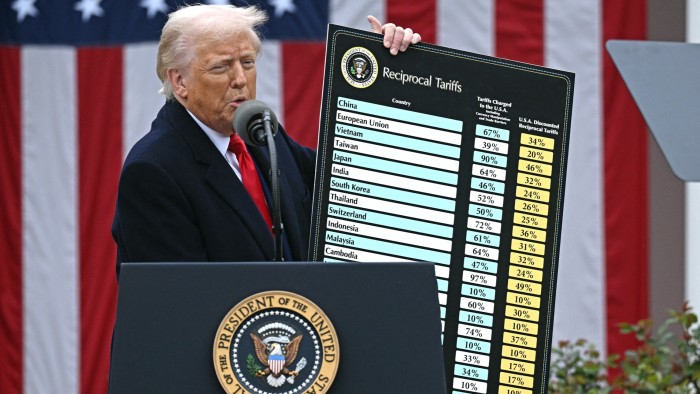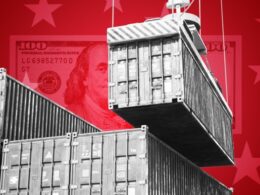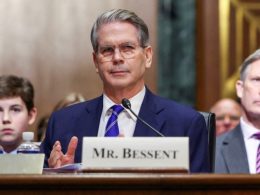This is an on-site version of the White House Watch newsletter. You can read the previous edition here. Sign up for free here to get it on Tuesdays and Thursdays. Email us at whitehousewatch@ft.com
Good morning and welcome to a new era of global trade competition. Follow the latest market and world reactions to Donald Trump’s tariffs on our live blog. Let’s dive right into:
You might not be able to see it, but Trump has put a protectionist barrier up around the world’s largest economy with sweeping new tariffs.
It’s a huge turning point for the US’s international economic policy — one that many economists fear will stoke inflation and increase the risk of a recession.
The new measures (explained in detail here) include a baseline tariff of 10 per cent on imports from all countries, plus “individualised” reciprocal higher levies on the 60 “worst offenders”, or countries with which the US says it has the largest trade deficits. The “reciprocal” tariffs, which range from 10 to 50 per cent based on a formula that has baffled economists, don’t spare Washington’s closest allies.
Among the countries hardest hit yesterday were China, members of the EU, Vietnam, Taiwan and Japan. Notably, Mexico and Canada escaped further tariff pain.
The new 34 per cent duty on China is in addition to an existing 20 per cent tariff, meaning the US’s main economic rival will contend with 54 per cent levies.
The huge tariffs threaten to wreak havoc on global supply chains. US companies, particularly tech giants such as Apple, are vulnerable given their heavy reliance on supply chains in Asia. Coffee drinkers and chocolate eaters should also prepare for higher prices.
But a key question is whether Trump will actually sustain such aggressive trade policies for an extended period, or reverse them under the weight of economic, market, political and legal pressure. [Free to read].
Wall Street futures tumbled yesterday after Trump’s announcement, and this morning, all eyes are on the US market open as investors brace for heavy losses. This morning, the dollar has dropped and global stocks are falling while government bonds are rallying.
Analysts said US trading partners would have little option but to retaliate against Trump’s measures, raising the prospect of an economically damaging global trade war. The EU is preparing to respond, but will hold off for four weeks to try to negotiate. Trump, meanwhile, warned countries not to strike back or the tariffs could get even higher.
“It’s our declaration of economic independence,” Trump said yesterday, holding up a poster with a list of the biggest tariffs. “For years, hard-working American citizens were forced to sit on the sidelines as other nations got rich and powerful, much of it at our expense, but now it’s our turn to prosper,” he added.
Be sure to check out our updated Trump tariff tracker
The latest headlines
What we’re hearing
When Brad Karp, chair of Paul Weiss, cut a deal with Trump to spare the law firm from a punitive executive order, it sent shockwaves through the upper echelons of the American legal establishment.
The deal, which has been followed by similar ones involving other firms, puts in stark relief the growing identity crisis among many major US law firms, especially those with strong ties to Wall Street.
Dealmaking has become a much more important part of corporate law firms’ business models over the past 20 years, alongside the explosive growth of the private equity industry and hedge funds. The star lawyers who play on these fields are rewarded with pay packages that mirror those of their Wall Street clients.
Trump’s decision to target these firms is playing into the culture clash between the deals attorneys — who are more focused on short-term transactions and are keener to stay out of the administration’s crosshairs — and the litigators, many of whom would take standing up to the government as a point of pride.
At Paul Weiss, some attorneys in the litigation department — once the firm’s key strength — were disturbed to see their powerful institution capitulate quickly, especially since they were exceptionally well armed to fight, people with direct knowledge of the matter told the FT’s Amelia Pollard, James Fontanella-Khan, Sujeet Indap and Stefania Palma.
But the lawyers in Paul Weiss’s ascendant M&A and private equity divisions were relieved. In the end, the senior management agreed unanimously to settle.
People close to Karp said that Paul Weiss did not actually make any big concession but agreed that the symbolism of a deal with the White House, while demeaning, was ultimately pragmatic.
“We’ve used Paul Weiss forever and . . . we would have had to seek new counsel if they didn’t settle,” said a person working at a company that regularly hires Paul Weiss and has ties with the federal government. “Brad did the right thing, although we realise it must have been humiliating for him and the legal industry . . . the problem isn’t Brad but it’s Trump.”
Viewpoints
-
It’s looking ugly for Wall Street ahead of the market open as Trump goes for shock therapy, Robert Armstrong and Aiden Reiter write in the Unhedged newsletter. Sign up for a free trial to read Unhedged on tariffs’ implications for growth, inflation, interest rates, stocks and Treasuries.
-
To US trading partners, yesterday marked the end of the global trading era, and while the economic consequences are in the sharpest focus, the geopolitical fallout could endure much longer, writes Edward Luce.
-
Trump’s decision about TikTok will shape the AI race, explains chip expert Chris Miller.
-
There is a clear upside for China as Trump’s own cultural revolution destroys the US’s global credibility, according to Martin Wolf.
Source link











